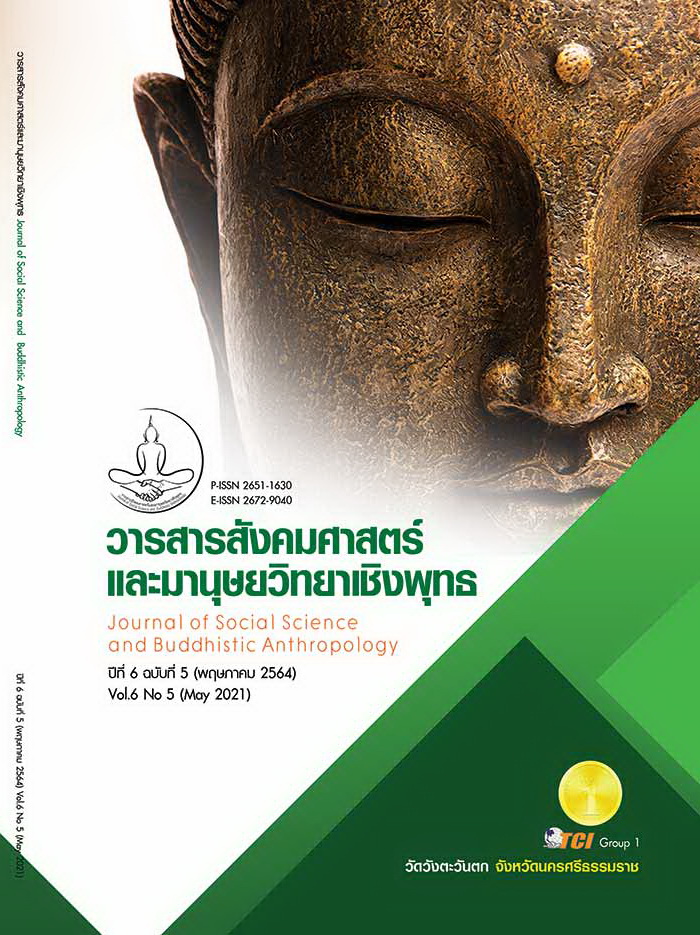AN ANALYTICAL STUDIES PROCESS AND OUTCOMES OF PROJECT OF MONKS TEACHING MORALITYI IN SCHOOL
Keywords:
Process, Outcome, Moral Teaching in The School ProjectAbstract
The objectives of this article were to: 1) study the implementation of moral teaching in the school project, and 2) analyze the achievement of the implement of moral teaching in the school project of Mahachulalongkornrajavidyalaya University. This was integrated research methods both quantitative and questionnaires. Use Stratified Random Sampling the sample group includes: students, moral teaching in the school, mentors, and administrators of 1,600 peoples. Using statistical analyze the frequency, percentage, mean and standard deviation. And qualitative In-depth interviews by purposive sampling were key informants such as students, moral teaching in the school, mentors, and administrators of 10 peoples. By content analysis and summarizing as an overview. The research was found that: 1) implement of moral teaching in the school project are 4 aspects, overall is high level includes 1.1) moral teaching management ( = 3.60, S.D. = .840), 1.2) develop of the master of morality (
= 3.63, S.D. = .829), 1.3) effectiveness the of moral teaching in the school (
= 3.67, S.D. = .849), and 1.4) process of monitoring and controlling the quality of moral teachings (
= 3.69, S.D.= .850). 2) Achievement of the implement of moral teaching in the school project, overall is high level by group is the administrators, mentors, and students are 4 aspects includes 2.1) students’ knowledge about Buddhism, 2.2) students’ attitude towards the study of Buddhism, 2.3) moral behavior of the learners, and 2.4) teaching efficiency of the moral monks. The moral teaching in the School project is a very good project because it acquires knowledge fully understand Buddhism, know how to practice, gain access to the Buddhist essence, make the child relevant to the religion and perform the duties of the Buddhists properly.
References
กรมการศาสนา เลขานุการคณะกรรมการส่งเสริมคุณธรรมแห่งชาติ. (2559). แผนแม่บทส่งเสริมคุณธรรมแห่งชาติ ฉบับที่ 1 2560 - 2564) ตามมติคณะรัฐมนตรี เมื่อวันที่ 12 กรกฎาคม 2559 คณะกรรมการส่งเสริมคุณธรรมแห่งชาติ กระทรวงวัฒนธรรม . กรุงเทพมหานคร: กรมการศาสนา เลขานุการคณะกรรมการส่งเสริมคุณธรรมแห่งชาติ.
ครูพี่เลี้ยงพระสอนศีลธรรม. (24 กันยายน 2563). การศึกษาวิเคราะห์เชิงกระบวนการและผลสัมฤทธิ์ของโครงการพระสอนศีลธรรมในโรงเรียน. (พระศรีธรรมภาณี, ผู้สัมภาษณ์)
ดํารงค์ เบญจคีรี และคณะ. (2563). ปัจจัยที่ส่งผลต่อประสิทธิภาพของโครงการพระสอนศีลธรรมในโรงเรียน สังกัดมหาวิทยาลัยมหามกุฎราชวิทยาลัย. วารสารศึกษาศาสตร์ มมร. คณะศึกษาศาสตร์ มหาวิทยาลัยมหามกุฏราชวิทยาลัย, 8(1), 45-63.
นักเรียน. (24 กันยายน 2563). การศึกษาวิเคราะห์เชิงกระบวนการและผลสัมฤทธิ์ของโครงการพระสอนศีลธรรมในโรงเรียน. (พระศรีธรรมภาณี, ผู้สัมภาษณ์)
บุญชม ศรีสะอาด. (2556). วิธีการทางสถิติสำหรับการวิจัย. (เล่มที่ 2). กรุงเทพมหานคร: สุวีริยาการพิมพ์.
ผู้บริหารสถานศึกษา. (24 กันยายน 2563). การศึกษาวิเคราะห์เชิงกระบวนการและผลสัมฤทธิ์ของโครงการพระสอนศีลธรรมในโรงเรียน. (พระศรีธรรมภาณี, ผู้สัมภาษณ์)
พระราชวรเมธี และคณะ. (2563). แผนยุทธศาสตร์การปฏิรูปกิจการพระพุทธศาสนา 2560-2564 การนำนโยบายสู่การปฏิบัติ. เรียกใช้เมื่อ 17 กันยายน 2563 จาก https://www.posttoday.com/dhamma/513945
พระสมุห์สมชาย สิริสมฺปนฺโน (มีสุดใจ) และคณะ. (2560). การปฏิบัติงานของพระสอนศีลธรรมในโรงเรียนประเทียบวิทยาทาน อำเภอวิหารแดง จังหวัดสระบุรี. วารสาร มจร สังคมศาสตร์ปริทรรศน์, 6(2), 491-504.
พระสอนศีลธรรม. (24 กันยายน 2563). การศึกษาวิเคราะห์เชิงกระบวนการและผลสัมฤทธิ์ของโครงการพระสอนศีลธรรมในโรงเรียน. (พระศรีธรรมภาณี, ผู้สัมภาษณ์)
สำนักงานคณะกรรมการพัฒนาเศรษฐกิจและสังคมแห่งชาติ. (2554). แผนพัฒนาเศรษฐกิจและสังคมแห่งชาติ ฉบับที่ 11 พ.ศ. 2555-2559. กรุงเทพมหานคร: สำนักงานคณะกรรมการพัฒนาเศรษฐกิจและสังคมแห่งชาติ.
สำนักงานคณะกรรมการพัฒนาเศรษฐกิจและสังคมแห่งชาติ. (2555). รายงานผลการประเมินโครงการพระสอนศีลธรรมในโรงเรียน. พระนครศรีอยุธยา: มหาวิทยาลัยมหาจุฬาลงกรณราชวิทยาลัย.
สำนักงานพระสอนศีลธรรมในโรงเรียน มหาวิทยาลัยมหาจุฬาลงกรณราชวิทยาลัย. (2557). รายงานผลการประเมินโครงการพระสอนศีลธรรมในโรงเรียน. พระนครศรีอยุธยา: มหาวิทยาลัยมหาจุฬาลงกรณราชวิทยาลัย.
สำนักงานพระสอนศีลธรรมในโรงเรียน มหาวิทยาลัยมหาจุฬาลงกรณราชวิทยาลัย. (2563). รายงานผลการประเมินโครงการพระสอนศีลธรรมในโรงเรียน. พระนครศรีอยุธยา: มหาวิทยาลัยมหาจุฬาลงกรณราชวิทยาลัย.
Cronbach, L. J. (1990). Essentials of psychological testing. (5th ed.). New York: Harper Collins Publishers.
Krejcie, R. V. & Morgan, D. W. (1970). Determining Sample Size for Research Activities. Educational and Psychological Measurement, 30(3), 607-610.
Likert, R. (1967). "The Method of Constructing and Attitude Scale”. In Reading in Fishbeic, M (Ed.), Attitude Theory and Measurement (pp. 90-95). New York: Wiley & Son.









